Sustainability Is In Our DNA: 5 Things To Know
Sustainability Is In Our DNA: 5 Things To Know
Since 1997, Verdure Sciences has prioritized sustainability. We’ve seen it as part of our culture, and we’ve lived it through the years as we’ve looked for ways to help protect our world. Ethically procuring our extracts, developing Verdugration®, investing in a transparent supply chain, promoting more sustainable farming techniques with our partners, and tracking our ecological footprint have all been part of this work.
It goes beyond plant extracts and the ingredients to be able to generate and distribute relevant messages about our sustainable approach and direct sharing of benefits with all our stakeholders including growers and farmers. We want to share the behind-the-scenes work we’re doing with you, our customers. Here are five key insights from throughout our sustainability report:
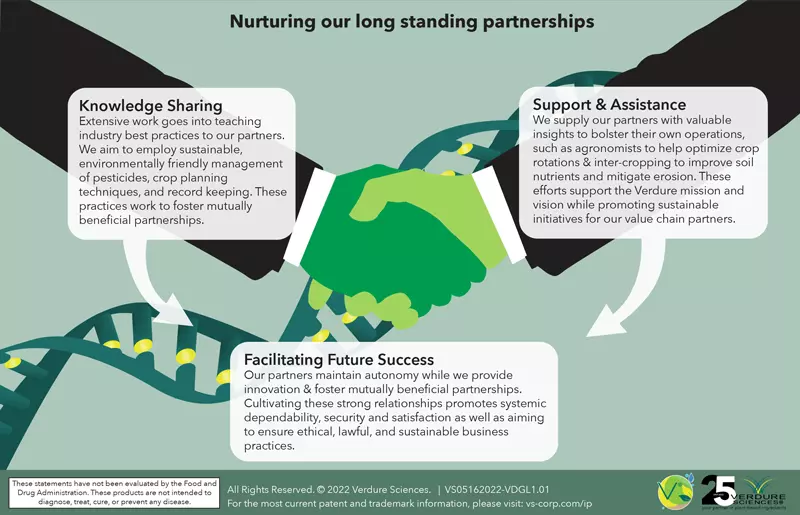
Long Standing Partnerships
Verdure strives to maintain long-term relationships within the supply chain of our raw materials for superior quality, a high level of assurance, and consistency in the botanicals we source for our extracts.
Long-term relationships with our manufacturing partners are at the core of our business. This has been prioritized with consistent communication focusing on conveying and receiving important information, mitigating identified risks, maintaining transparency, and building trust.
We are able to support farmers in crop cultivation by extending assistance of nutrient supply and application, infrastructural support in pre and post harvesting processes, and enhancing awareness about sustainable farming practices. We are also extending a hand in improvising farming practices utilizing science-based approaches. We help increase farmer’s income by reducing the cost of cultivation.
For example, through providing agronomy support, we are able to suggest best fits for crop rotation with the intercropping of seasonal fruits and vegetables, and these income-supporting efforts also nurture the soil health, while our partners maintain autonomy for a mutually beneficial relationship.
Over time, we’ve found our partner relationships to be more successful, long-lasting, and trustworthy. Additionally, we have developed a sustainability assessment with our supply chain partners to evaluate performance in areas of environmental sustainability, ethical trade, and social welfare.
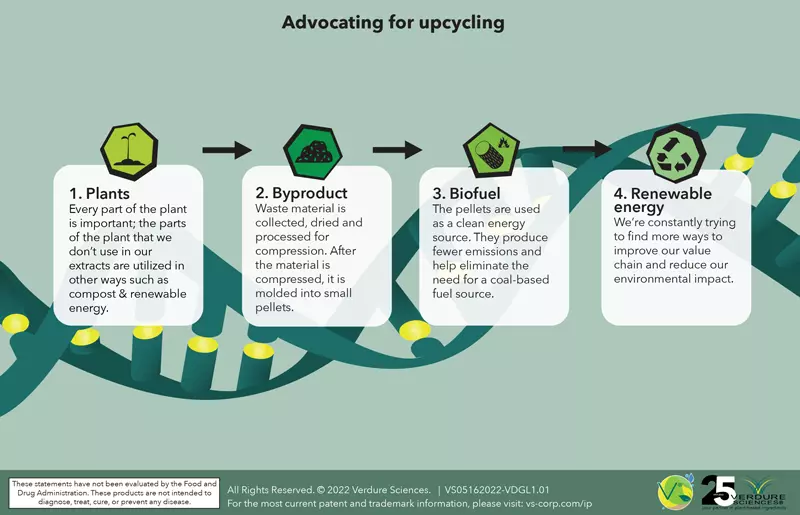
Upcycling & Recycling
According to the EPA, agricultural byproducts emit approximately 975 kg CO2 per short ton. In comparison, various coal sources range from 1,300–2,800 kg CO2 per short ton–or a 25-65% decrease in potential emissions1.
In order to reduce our value chain’s reliance on fossil fuels, our manufacturing partner facilities reuse plant byproducts following extraction. This process utilizes materials that would otherwise be waste, i.e. plant parts not used in our extracts, for renewable energy. The waste material is compressed and molded into small pellets which are used for clean, recycled energy at the manufacturing plant.
By-products from the manufacturing are given free of cost to neighboring farmers as a soil amendment to increase organic matter in the soil. This reduces the potential emission due to the destruction.
Verdure is also working on sustainable packaging options to reduce the impact of packaging waste on the environment.
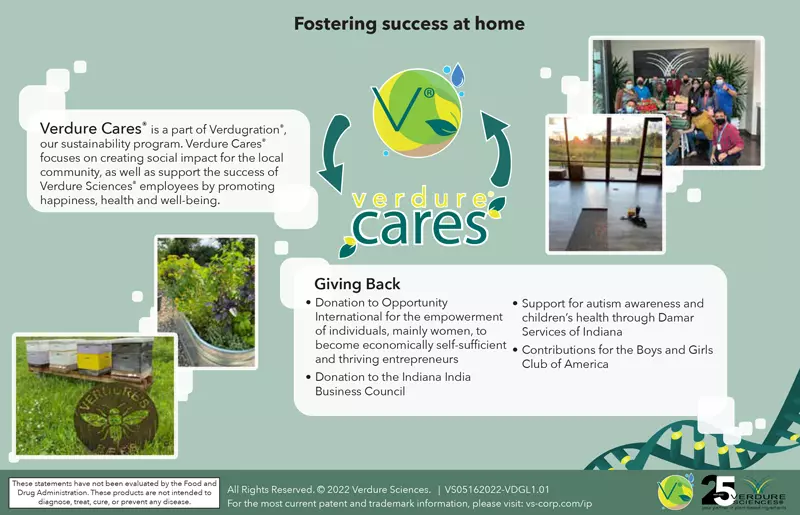
Verdure Cares®
We know that corporate social responsibility extends to all aspects of our business, which is why we formalized this belief with Verdure Cares®. This internal program is a segment of Verdugration® that aims to broaden the scope of our stewardship efforts to encompass the social and economic wellbeing of our internal and external stakeholders. Verdure Cares includes initiatives supporting farmers, employees, corporate philanthropic efforts, and as previously mentioned above, long standing partnerships for a long-lasting, holistic approach.
Giving back to our community and those in which we operate is a core value. We support groups whose philanthropic goals are similar to our own. For example, in 2021 we continued to support our local community in Indiana by providing financial resources and supplies:
- Support for autism awareness and children’s health through Damar Services of Indiana
- Contributions for the Boys and Girls Club of America
- Donation to the Indiana India Business Council
- Donation for local water conservation (rain barrel purchases & donation)
- Conner Prairie: Living History Museum (a Smithsonian Affiliate) donations for employee wellness and historical botanical gardens
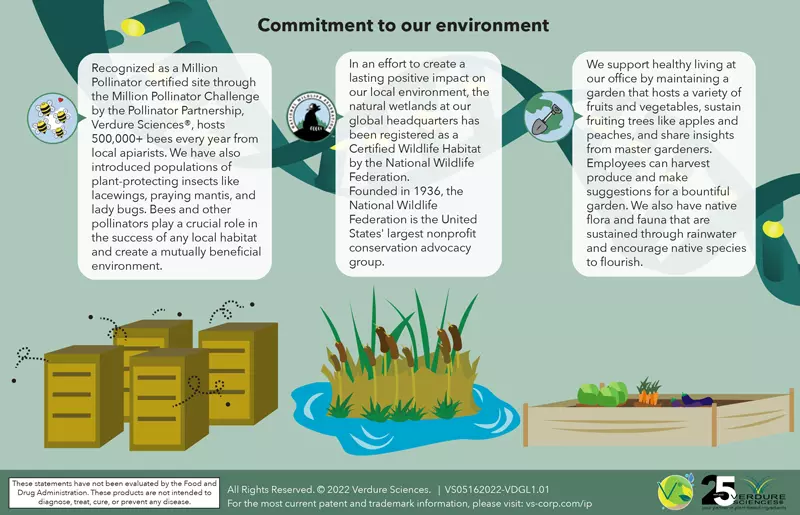
Million Pollinator Garden Challenge
Beginning in June 2020, we have been the home to four beehives at our global headquarters in Noblesville, Indiana. We host beehives from a local apiary based on their immense knowledge and advocacy for healthy bee populations.
Since we are able to seasonally host half a million bees, we’ve been recognized as a Million Pollinator certified site through the Million Pollinator Garden Challenge by the Pollinator Partnership. The partnership is described as “a nationwide call to action to preserve and create gardens and landscapes that help revive the health of bees, butterflies, birds, bats and other pollinators across America2” as well as a platform to make the connections between pollinators and the healthy food people eat.
Bees are not only beneficial to the environment in which they reside, but they also play a crucial role in the ecosystem by aiding in pollination. These bees have a direct effect on our food supply. By cultivating a pollinator-friendly garden at our HQ, we’re helping honeybees, bumble bees, and other bee species and pollinators who provide us one out of every three bites of food2.
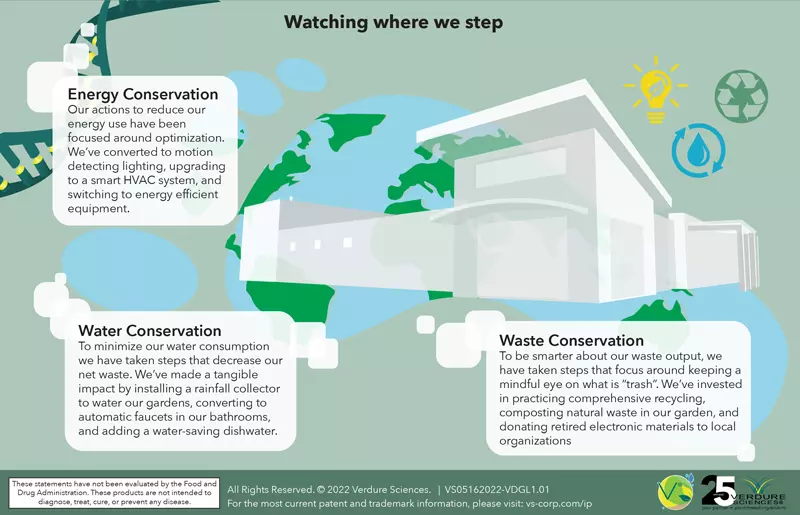
Ecological Footprint
We constantly work to minimize our ecological footprint through resource conservation, refining our supply chain journey, and eco-friendly packaging initiatives. Energy, water, and waste conservation all contribute to our overarching goals for sustainable, climate friendly practices.
Verdure Sciences® is making efforts to improve our output for the planet. We have contributed to a number of carbon emission reduction efforts, such as:
Energy Conservation
- Lighting efficiencies – skylights, motion detectors, and timers
- Eco settings for heating/cooling
- Eco-friendly office supplies
- Green building standards
- Eco-friendly settings for the office, breakroom, and bathroom appliances
- Energy conserving fixtures and appliances
- Eco-friendly HVAC operations
Water Conservation
- Restroom facilities utilize motion sensor faucets
- Eco-efficient dishwasher
- Rain garden of native species
Waste Conservation
- Onsite greenhouse
- Regular recycling pickups
- Compost for use in the vegetable & herb garden
- Guidance on materials to recycle vs. compost
- Donate electronic materials
- Provide reusable cutlery and dishes
Still Upcoming This Year
Stay tuned for regular blogs featuring our innovative efforts in areas of sustainable, traceable, and transparent initiatives, as well as comprehensive information on how Verdugration® and Verdure Cares® are vital parts of Verdure Sciences®:
- Case studies & highlight reels featuring: Bacopa monnieri, Boswellia serrata, holy basil (Ocimum sanctum), turmeric (Curcuma longa), pomegranate (Punica granatum)
- Sustainable efforts at our Noblesville, IN HQ
- The Sustainable Turmeric Program (STP)
- Sustainability through our teams
- Verdure & the UN Sustainable Development Goals (SDGs)
References:
Since 1997, Verdure Sciences has prioritized sustainability. We’ve seen it as part of our culture, and we’ve lived it through the years as we’ve looked for ways to help protect our world. Ethically procuring our extracts, developing Verdugration®, investing in a transparent supply chain, promoting more sustainable farming techniques with our partners, and tracking our ecological footprint have all been part of this work.
It goes beyond plant extracts and the ingredients to be able to generate and distribute relevant messages about our sustainable approach and direct sharing of benefits with all our stakeholders including growers and farmers. We want to share the behind-the-scenes work we’re doing with you, our customers. Here are five key insights from throughout our sustainability report:

Long Standing Partnerships
Verdure strives to maintain long-term relationships within the supply chain of our raw materials for superior quality, a high level of assurance, and consistency in the botanicals we source for our extracts.
Long-term relationships with our manufacturing partners are at the core of our business. This has been prioritized with consistent communication focusing on conveying and receiving important information, mitigating identified risks, maintaining transparency, and building trust.
We are able to support farmers in crop cultivation by extending assistance of nutrient supply and application, infrastructural support in pre and post harvesting processes, and enhancing awareness about sustainable farming practices. We are also extending a hand in improvising farming practices utilizing science-based approaches. We help increase farmer’s income by reducing the cost of cultivation.
For example, through providing agronomy support, we are able to suggest best fits for crop rotation with the intercropping of seasonal fruits and vegetables, and these income-supporting efforts also nurture the soil health, while our partners maintain autonomy for a mutually beneficial relationship.
Over time, we’ve found our partner relationships to be more successful, long-lasting, and trustworthy. Additionally, we have developed a sustainability assessment with our supply chain partners to evaluate performance in areas of environmental sustainability, ethical trade, and social welfare.

Upcycling & Recycling
According to the EPA, agricultural byproducts emit approximately 975 kg CO2 per short ton. In comparison, various coal sources range from 1,300–2,800 kg CO2 per short ton–or a 25-65% decrease in potential emissions1.
In order to reduce our value chain’s reliance on fossil fuels, our manufacturing partner facilities reuse plant byproducts following extraction. This process utilizes materials that would otherwise be waste, i.e. plant parts not used in our extracts, for renewable energy. The waste material is compressed and molded into small pellets which are used for clean, recycled energy at the manufacturing plant.
By-products from the manufacturing are given free of cost to neighboring farmers as a soil amendment to increase organic matter in the soil. This reduces the potential emission due to the destruction.
Verdure is also working on sustainable packaging options to reduce the impact of packaging waste on the environment.

Verdure Cares®
We know that corporate social responsibility extends to all aspects of our business, which is why we formalized this belief with Verdure Cares®. This internal program is a segment of Verdugration® that aims to broaden the scope of our stewardship efforts to encompass the social and economic wellbeing of our internal and external stakeholders. Verdure Cares includes initiatives supporting farmers, employees, corporate philanthropic efforts, and as previously mentioned above, long standing partnerships for a long-lasting, holistic approach.
Giving back to our community and those in which we operate is a core value. We support groups whose philanthropic goals are similar to our own. For example, in 2021 we continued to support our local community in Indiana by providing financial resources and supplies:
- Support for autism awareness and children’s health through Damar Services of Indiana
- Contributions for the Boys and Girls Club of America
- Donation to the Indiana India Business Council
- Donation for local water conservation (rain barrel purchases & donation)
- Conner Prairie: Living History Museum (a Smithsonian Affiliate) donations for employee wellness and historical botanical gardens

Million Pollinator Garden Challenge
Beginning in June 2020, we have been the home to four beehives at our global headquarters in Noblesville, Indiana. We host beehives from a local apiary based on their immense knowledge and advocacy for healthy bee populations.
Since we are able to seasonally host half a million bees, we’ve been recognized as a Million Pollinator certified site through the Million Pollinator Garden Challenge by the Pollinator Partnership. The partnership is described as “a nationwide call to action to preserve and create gardens and landscapes that help revive the health of bees, butterflies, birds, bats and other pollinators across America2” as well as a platform to make the connections between pollinators and the healthy food people eat.
Bees are not only beneficial to the environment in which they reside, but they also play a crucial role in the ecosystem by aiding in pollination. These bees have a direct effect on our food supply. By cultivating a pollinator-friendly garden at our HQ, we’re helping honeybees, bumble bees, and other bee species and pollinators who provide us one out of every three bites of food2.

Ecological Footprint
We constantly work to minimize our ecological footprint through resource conservation, refining our supply chain journey, and eco-friendly packaging initiatives. Energy, water, and waste conservation all contribute to our overarching goals for sustainable, climate friendly practices.
Verdure Sciences® is making efforts to improve our output for the planet. We have contributed to a number of carbon emission reduction efforts, such as:
Energy Conservation
- Lighting efficiencies – skylights, motion detectors, and timers
- Eco settings for heating/cooling
- Eco-friendly office supplies
- Green building standards
- Eco-friendly settings for the office, breakroom, and bathroom appliances
- Energy conserving fixtures and appliances
- Eco-friendly HVAC operations
Water Conservation
- Restroom facilities utilize motion sensor faucets
- Eco-efficient dishwasher
- Rain garden of native species
Waste Conservation
- Onsite greenhouse
- Regular recycling pickups
- Compost for use in the vegetable & herb garden
- Guidance on materials to recycle vs. compost
- Donate electronic materials
- Provide reusable cutlery and dishes
Still Upcoming This Year
Stay tuned for regular blogs featuring our innovative efforts in areas of sustainable, traceable, and transparent initiatives, as well as comprehensive information on how Verdugration® and Verdure Cares® are vital parts of Verdure Sciences®:
- Case studies & highlight reels featuring: Bacopa monnieri, Boswellia serrata, holy basil (Ocimum sanctum), turmeric (Curcuma longa), pomegranate (Punica granatum)
- Sustainable efforts at our Noblesville, IN HQ
- The Sustainable Turmeric Program (STP)
- Sustainability through our teams
- Verdure & the UN Sustainable Development Goals (SDGs)
References:
About Verdure Sciences®:
Verdure Sciences manages ingredient innovation throughout the integration of supply network, production, and research platforms. With an expanding pipeline of proprietary, standardized botanical ingredients supported by pharmacokinetic, pharmacodynamic, and clinical research profiles, we work toward our unified vision to offer safe, effective ingredient solutions. Verdure Sciences® is a registered trademark of Verdure Sciences®, Inc.
For our most current patent and trademark information, please visit: https://vs-corp.com/ip/ | https://vs-corp.com for more information
About Verdure Sciences®:
Verdure Sciences manages ingredient innovation throughout the integration of supply network, production, and research platforms. With an expanding pipeline of proprietary, standardized botanical ingredients supported by pharmacokinetic, pharmacodynamic, and clinical research profiles, we work toward our unified vision to offer safe, effective ingredient solutions. Verdure Sciences® is a registered trademark of Verdure Sciences®, Inc.
For our most current patent and trademark information, please visit: https://vs-corp.com/ip/ | https://vs-corp.com for more information


